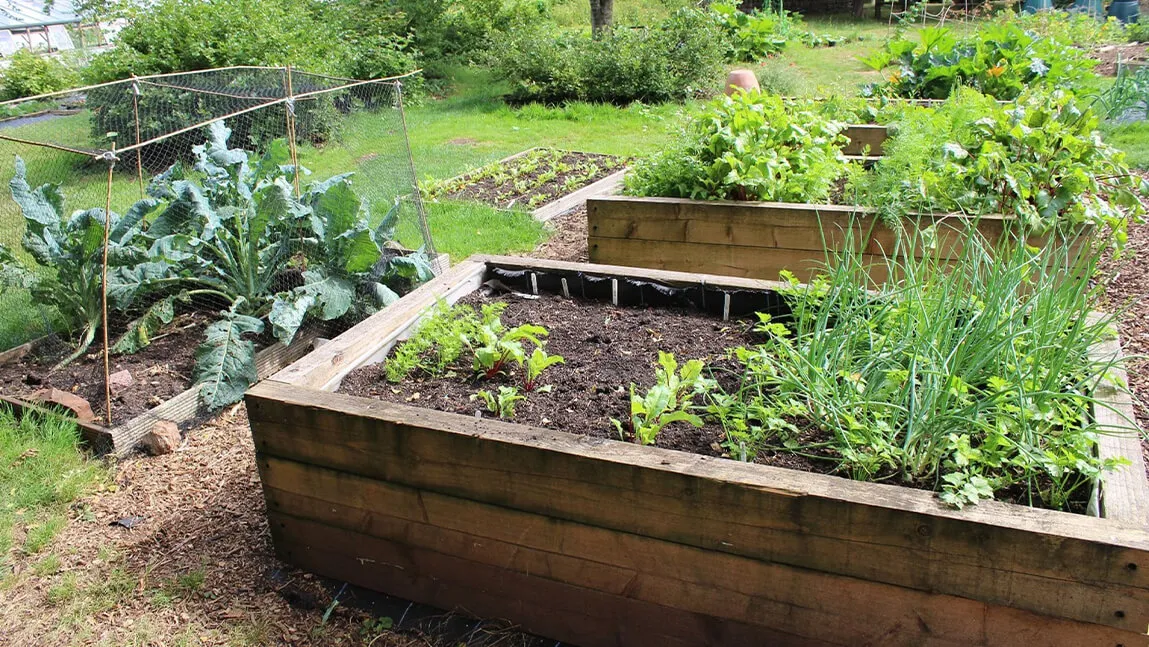By Nadie VanZandt
Extension Master Gardener
University of Vermont
For many home gardeners, raised beds offer better soil conditions, better drainage and aeration than in-ground gardens. They also extend the growing season by warming the soil earlier and, not least, they are easier on the body. Fall is a good time to start thinking about your raised beds for next year.
Did you know that the composition of the soil in raised beds is vital to their success? Amending soil with compost is a major factor in promoting soil health but, when applied in excess, compost can be detrimental.
A fertile soil is made up of 45 percent minerals, 5 percent organic matter, 25 percent water and 25 percent air. These percentages translate into a growing medium of 70 percent essential minerals from soil and 30 percent compost, taking into consideration that water and air are present in both soil and compost. For raised beds, this corresponds to no more than a 1–2-inch layer of compost mixed into a 6-inch layer of soil.
Minerals in soils are inorganic materials derived from a parent material, usually local geological bedrock. They are a crucial source of nutrients for plants and are essential for plant structure and resistance to disease. As well, they impart better flavor and quality to the fruits and vegetables that we need for a healthy diet.
Organic materials found in soils are living organisms like microbes, bacteria, fungi, large and small insects and carbon-based materials from compost. They deliver important nutrients to plants. In addition, plants use carbon as a main source of energy to build plant tissues.
Products labeled as garden soil, potting soil and topsoil are often exclusively organic material. When sourcing soil for your raised bed, seek a quality mineral-based soil from a reputable vendor who can back their product with a soil test report and/or detailed content. The product should have a significant amount of mineral materials.
At first, growing in raised beds filled largely with compost will yield good results because plant nutrients are readily available. But as compost ages, decomposition slows and the release of nutrients decreases. Eventually, plant growth, flowering and fruit production diminishes, leading gardeners to apply additional compost (or fertilizers) to boost the supply of nutrients.
Continued application of compost, particularly those that are manure-based, can be detrimental to your plants as a surplus of compost can create a build-up of phosphorus and ammonium.
Phosphorus in excess can adversely affect your plants' ability to absorb iron and zinc and excess ammonium can result in excess soluble salts, which can burn plant roots and impact the ability of the plant to develop flowers or fruit. Excess nitrogen and phosphorus are also readily leached into groundwater and can cause a serious environmental problem as it creates toxic algae blooms in lakes and ponds.
Compost is not a long-term source of potassium. Found in soluble form in compost, potassium is easily lost through leaching. During drought conditions, compost dries out and repels rather than absorbs water, leading to run-off.
Over time, compost alone will lose its structure and volume. Without the necessary mineral material, compost will form a thick non-porous layer that inhibits drainage, reduces soil aeration and promotes disease. Most importantly, many vital minerals are not present in compost in significant amounts to ensure optimal plant health.
This fall, before putting your raised beds to rest, consider ordering a soil test to analyze your soil. Kits are available through the University of Vermont Agricultural and Environmental Testing Lab (https://pss.uvm.edu/ag_testing). Be sure to mark on your kit that this is for raised beds, since the lab runs a different analysis better suited for this situation.
You'll have all winter to plan soil amendment strategies. Meanwhile, prevent leaching and loss of nutrients by covering your raised beds with leaf mulch or straw, instead of compost.
Nadie VanZandt is a UVM Extension Master Gardener from Panton.
